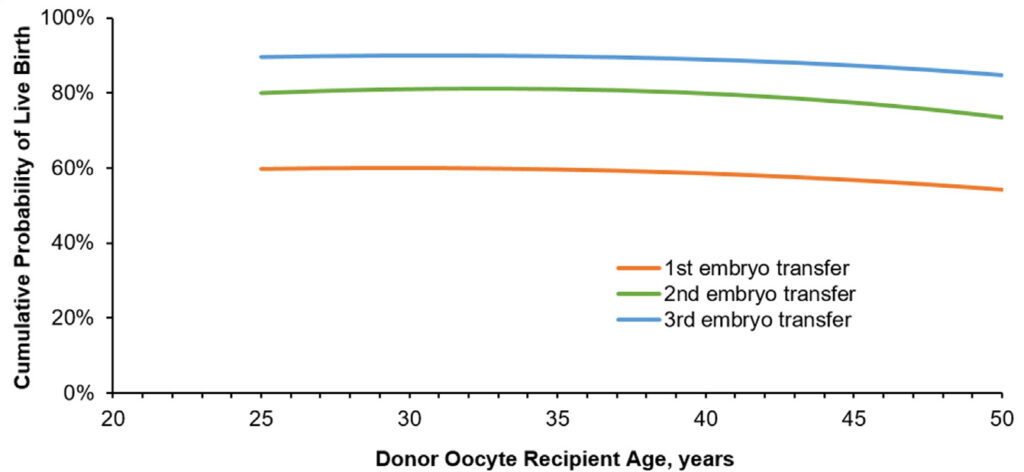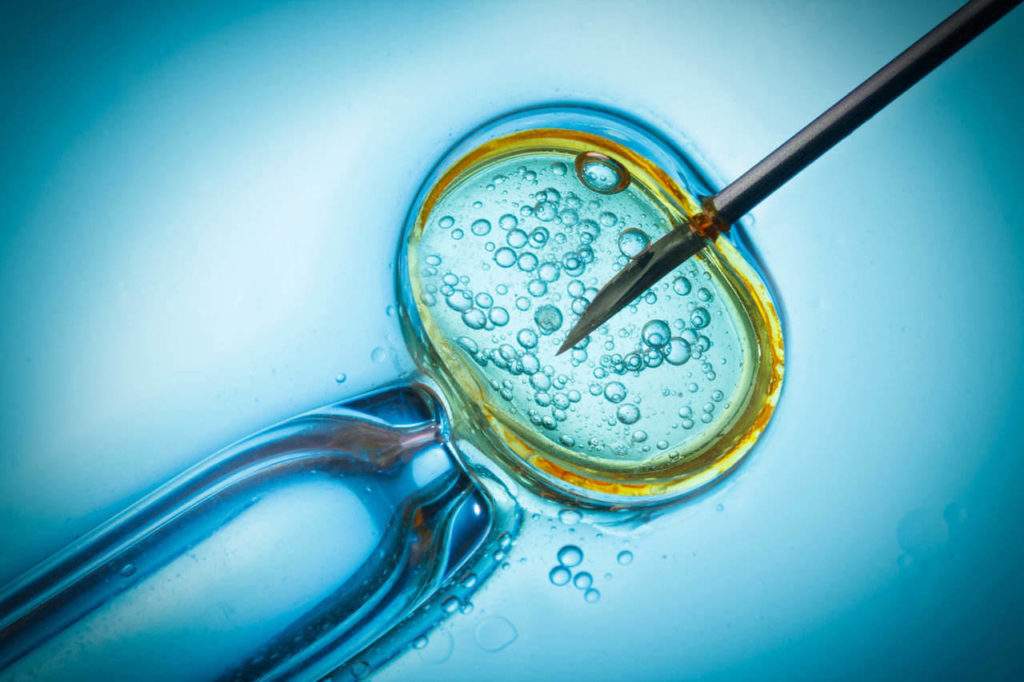Although nowadays clinics all over the world communicate their high success rates, you have to remember that the treatment sometimes fails. When that happens you should think about taking some time to regenerate physically and emotionally. There is life after IVF. Before you decide what to do next, take these options under consideration.
How many donor eggs cycle does it take to have a baby?
Statistically, three cycles of donor egg IVF offer about an 80% chance of giving birth to a child. Generally, the success rate of IVF treatment with donor eggs averages 50-60% (pregnancy rates). However, clinics often communicate cumulative donor egg IVF success rates, which can reach even 80-90% after three cycles of egg donation. These figures refer to “pregnancy”—for live births, these statistics should be reduced by an average of about 8%. The effectiveness of IVF with donor eggs does not depend on the woman’s age.
How many donor egg IVF cycles are typically needed for success?
According to statistical data, completing three to four donor egg IVF cycles significantly increases your chances of success, bringing you very close to achieving a successful pregnancy.
The chart below shows the cumulative probability of live birth according to patient’s age.

You may be interested in reading: Cumulative IVF success rates – facts and myths revealed
What are the success rates for IVF with donor eggs?
Donor egg IVF generally achieves success rates ranging from 50% to 60% on average. For a thorough understanding of these statistics, please refer to our guide on IVF with donor eggs success rates, where you’ll find all the information you need about donor egg success rates. According to the Centers for Disease Control and Prevention (CDC), the average IVF success rate with fresh donor eggs (live-birth) is 53.5% (based on 2021 data). Popular European fertility clinics report similar results, with many even surpassing this figure. Notably, egg donation success rates are not impacted by a woman’s age.
Why does IVF with donor eggs sometimes fail?
While IVF with donor eggs generally offers high success rates, it’s important to understand that it doesn’t guarantee a successful outcome every time. Several factors can contribute to the failure of the procedure despite the excellent quality of donor eggs. One key factor is embryo quality. Even with top-notch donor eggs, about 30% of the eggs retrieved may lead to embryos with an abnormal number of chromosomes, known as aneuploid embryos. This can be influenced by factors such as the ovarian stimulation protocols used and the laboratory techniques at different clinics.
Another consideration involves endometrial and immune factors. A receptive endometrium and a balanced immune system are vital for successful implantation. The timing of endometrial receptivity varies among individuals, making a personalized approach to embryo transfer essential. The male factor also plays a significant role. The health of the sperm is crucial in developing a healthy embryo, and issues like DNA fragmentation and chromosomal abnormalities can negatively affect the success rate of IVF.
Additionally, genetic imbalances can occur even when using eggs from young donors. Approximately 25% of embryos may have genetic issues that can result in implantation failures or early miscarriages. It’s also important to note that reproductive medicine is a complex field where not all processes inside oocytes, embryos, and the woman’s body are fully understood. This inherent uncertainty means that despite the best efforts and advanced technologies, success cannot be guaranteed in every case.
What factors contribute to donor egg IVF failure?
Donor egg IVF treatments can sometimes fail due to a variety of factors. One significant reason is the quality of the embryos. Even when high-quality donor eggs are used, about 30% of the retrieved eggs may result in embryos with an abnormal number of chromosomes, a condition known as aneuploidy. The quality of the sperm also plays a crucial role in embryo development, so tests like karyotyping and DNA fragmentation analysis are often recommended to assess sperm health.
The health of the endometrium is another critical factor for successful implantation. A healthy uterine lining is essential, but anatomical issues such as fibroids, polyps, or other uterine abnormalities can impede the implantation process. In some cases, surgical interventions may be necessary to correct these issues and improve the chances of success.
Immunological factors might also contribute to implantation failure, although the scientific support for this is less definitive. Conditions like anti-thyroid antibodies could potentially affect implantation and may require specialized treatment protocols.
Lifestyle factors significantly impact the success rates of IVF treatments. Obesity, stress, smoking, and alcohol consumption can all negatively affect implantation. Obesity, in particular, is associated with insulin resistance and increased levels of pro-inflammatory cytokines, both of which can interfere with the implantation process.
Understanding the timing of endometrial receptivity is vital. The optimal thickness of the endometrium for implantation is generally between 12 and 15 millimeters. Deviations from this range can reduce the likelihood of a successful pregnancy.
Infections and bacterial imbalances within the endometrium can also play a role in implantation failure. Identifying and treating any underlying infections is important for improving success rates.
Adopting a personalized approach to treatment is essential. Since there is no one-size-fits-all solution to implantation failure, tailoring the treatment to address the specific needs and conditions of each individual can enhance the chances of a successful pregnancy.
How many IVF cycles before donor eggs IVF?
Choosing to proceed with IVF using donor eggs often comes after multiple unsuccessful attempts with a woman’s own eggs, especially in cases of advanced maternal age, recurrent implantation failures, or miscarriages. Research suggests that after four to six embryo transfers without success—particularly for women in their early to late 40s—it may be time to consider egg donation as an alternative. This is a profound decision that the couple should make together, supported by thorough information and psychological counseling.
Many patients, despite numerous failures in treatment with their own eggs, choose to continue this type of therapy. They do not want to move to IVF treatment with donor eggs as long as there is any chance of pregnancy. However, due to the high costs associated with IVF treatment and the significantly higher success rates of donor egg IVF, many patients decide to opt for egg donation.
You may be interested in reading: IVF success rates – myths and facts explained
What is the role of egg quality in donor egg IVF success?
The success of IVF with donor eggs largely depends on the quality of the donors’ eggs. This is a critical factor influencing treatment outcomes (assuming the partner’s sperm meets healthy parameters or sperm from a bank is used). Reputable IVF clinics that specialize in egg donation programs carefully screen their donors, ensuring the highest possible egg quality possible.
What are the top reasons for donor egg IVF failure?
Below is a comprehensive look at the different factors groups that can lead to egg donation failure. Keep in mind that every fertility journey is unique, and understanding these potential hurdles can help you and your medical team make the most informed decisions possible.
- Embryo Quality
A large share of implantation failures—often estimated at 70–80%—is related to the health of the embryo itself. Even when donor eggs are used, not every embryo will be genetically normal. Some embryos may have chromosomal imbalances that prevent them from developing properly or implanting in the uterus. This is why some clinics may suggest genetic screening (PGT-A) to evaluate embryos before transfer. - Uterine Environment
The uterine environment accounts for roughly 20–30% of implantation difficulties. Anatomical challenges such as fibroids (myomas), polyps, or scarring can stand in the way of a successful pregnancy. Additionally, infections or chronic inflammation—like endometritis—can create an inhospitable space for an embryo. Addressing these issues through diagnostic tests (e.g., hysteroscopy or ultrasound) and proper treatments can significantly improve the chances of a healthy implantation. - Immunological Factors
While the science on this is still evolving, certain immune-related challenges may contribute to repeated implantation failures. Conditions like anti-thyroid antibodies or other autoimmune disorders could interfere with embryo attachment. If your fertility specialist suspects an immune system component, additional testing and specialized treatments might be recommended. - Paternal Factors
It’s easy to assume that using donor eggs automatically bypasses most female-related concerns, but sperm health still matters. Sperm from an older partner or one with DNA fragmentation issues can influence embryo development. In some cases, advanced paternal age is associated with a greater risk of genetic mutations in sperm, which can in turn affect fertilization and implantation rates. - Endometrial Receptivity
Finally, timing is everything when it comes to embryo transfer. The endometrium goes through a “receptive window,” during which it’s most likely to allow the embryo to implant. Pinpointing this window—sometimes through specific tests that measure endometrial development—can be crucial for couples who have had multiple unsuccessful cycles. By synchronizing embryo transfer with the moment the uterine lining is most receptive, there’s a better chance of achieving a pregnancy.
The endometrium—often referred to as the uterine lining or implantation window—plays a pivotal role in successful egg donation treatments. Its thickness and overall receptivity are essential for embryo implantation. Typically, a measurement above 7.5 millimeters at the midpoint of the menstrual cycle is considered receptive, although individual factors and past treatment history can influence these guidelines.Because many IVF clinics prefer working with fresh donor eggs, synchronizing the donor’s and recipient’s cycles is an important step. This synchronization promotes follicular development in the donor while simultaneously preparing the recipient’s endometrial lining to be receptive. Performing both egg retrieval and embryo transfer within a single treatment window often means just one clinic visit is needed.Some clinics, however, opt to freeze embryos on Day 5 (the blastocyst stage) to avoid strict cycle synchronization. This strategy gives recipients additional time to optimize their endometrium before transfer, potentially enhancing the chances of a successful pregnancy. - Genetics
While donor eggs help address certain genetic challenges from the maternal side, genetics remain a multifaceted factor in the IVF process.- Embryo Genetics: Even if both donor and paternal genetic material appear healthy, each embryo can independently develop chromosomal abnormalities or may carry a single gene disorders.
- Egg Donor Genetics: Reputable clinics screen donors extensively, but there may still be inherited conditions or less common variants that standard screenings do not capture.
- Recipient Genetics: Although the recipient is not supplying the egg, pre-existing genetic predispositions may still influence implantation and pregnancy outcomes. In some situations, additional genetic counseling or testing (e.g., PGT-A or PGT-M for monogenic disorders) can provide better clarity and reduce certain genetic risks.
If you’re facing difficulties with an egg donation cycle/cycles, work closely with a trusted fertility specialist or clinic to investigate which factors might be contributing to your situation. Addressing issues like uterine health, lifestyle habits, immune system factors, and timing can greatly improve the likelihood of success. Each individual’s journey is unique, and by focusing on these key areas, you can optimize your chances and move closer to building the family you’ve been hoping for.
If you experience IVF donor egg implantation failure, your fertility doctor should investigate further what the causes are. Careful, step-by-step examination of IVF donor egg implantation failure and the patient’s circumstances should lead to alternative solutions.
Failed IVF cycle – take your time
According to experts you should take your time and try again after a couple of months if you still want to, of course. These treatments can be very stressful that is why you should take a break, forget about fertility drugs and take a “chill pill” instead. This should be the period of your mind and body renewal. Use this time to rethink your options and think about how you feel. You can also consider seeing a counselor.
However, if you feel you want to try again, discuss it with your clinic if you should try the treatment again. Go through your options with your doctor, should you try a different method or try the same one more time? Perhaps there are ways to improve IVF success to raise your chances a bit more.
Do not rush any decisions. After failed IVF with donor eggs, some people think that changing a doctor or a clinic is a good idea, especially when they have become frustrated with the lack of success. However, remember that your current clinic and its doctors know a lot about the specifics of your condition. Changing them could be the wrong way to go.
IVF failed again – should I stop the treatment?
Your last IVF failed? After multiple attempts, there comes a time when you may decide to stop the treatment. Stopping or halting the IVF treatment for some time is an individual decision to make. Women do that for various reasons. Some of them are as simple as lack of financial capabilities when you simply cannot afford another try. Let’s not forget it is not a cheap procedure and another one could be even more expensive if you decide to spend some additional money to boost your chances. However, there are IVF clinics that offer the IVF refund programs.
There is also a chance you won’t be emotionally capable to try again or you will just feel that the treatment overwhelmed you and put too much stress in your life. All that is OK. Do whatever your intuition tells you – if you think it is high time to get on with your life and stop the treatment, simply do it. The decision could also be taken out of your hands if your specialist tells you that there is too little or no chance at all of getting pregnant. Either way, if you feel you need failed IVF support and a helping hand to get over failed IVF, consider contacting a fertility patient support group or a counselor.
Find Top Egg Donation Clinics AbroadHow many failed IVF before giving up – other options
Stopping the treatment does not mean you are out of your options. There are other people that were in the same situation as you. Some of them opted for surrogacy, some of them decided to adopt, become foster parents or even do volunteer work with children. You can contact such couples and seek their advice on what to do next. Whatever option you choose, make sure it feels right. You should also remember that many couples come to terms with their infertility and lead a full life with no children. Some of them even write blogs about their experiences and feelings. Many of them discover that their relationship and life after IVF can be stronger and meaningful.
Find Top Egg Donation Clinics AbroadIf you need help choosing an IVF clinic abroad, spare 3 minutes of your time. You will save at least a few hours.
If you are looking for an egg donation clinic abroad, use the eggdonationfriends unique patients tool – Clinic Matching Test. We analyse your needs and choose 3 overseas clinics which match your expectations. Our database of IVF centres includes only trusted fertility clinics which have experience in providing high-quality services to international patients. The suggested IVF centres will contact you directly within 3 working days. Spare 3 minutes of your time – you will save at least a few hours! Our assistance is free of charge.
You may be interested in reading heartbreaking stories of patients who went through IVF:
- The Good Fight – IVF and egg donation in Spain – Lisa and Mike went through 4 IVF cycles in total
- A couple with 5 years of primary infertility – Patient Success Story – detailed case study provided by an IVF clinic from Spain
You may be interested in watching webinars by top IVF experts – regarding IVF failures:



